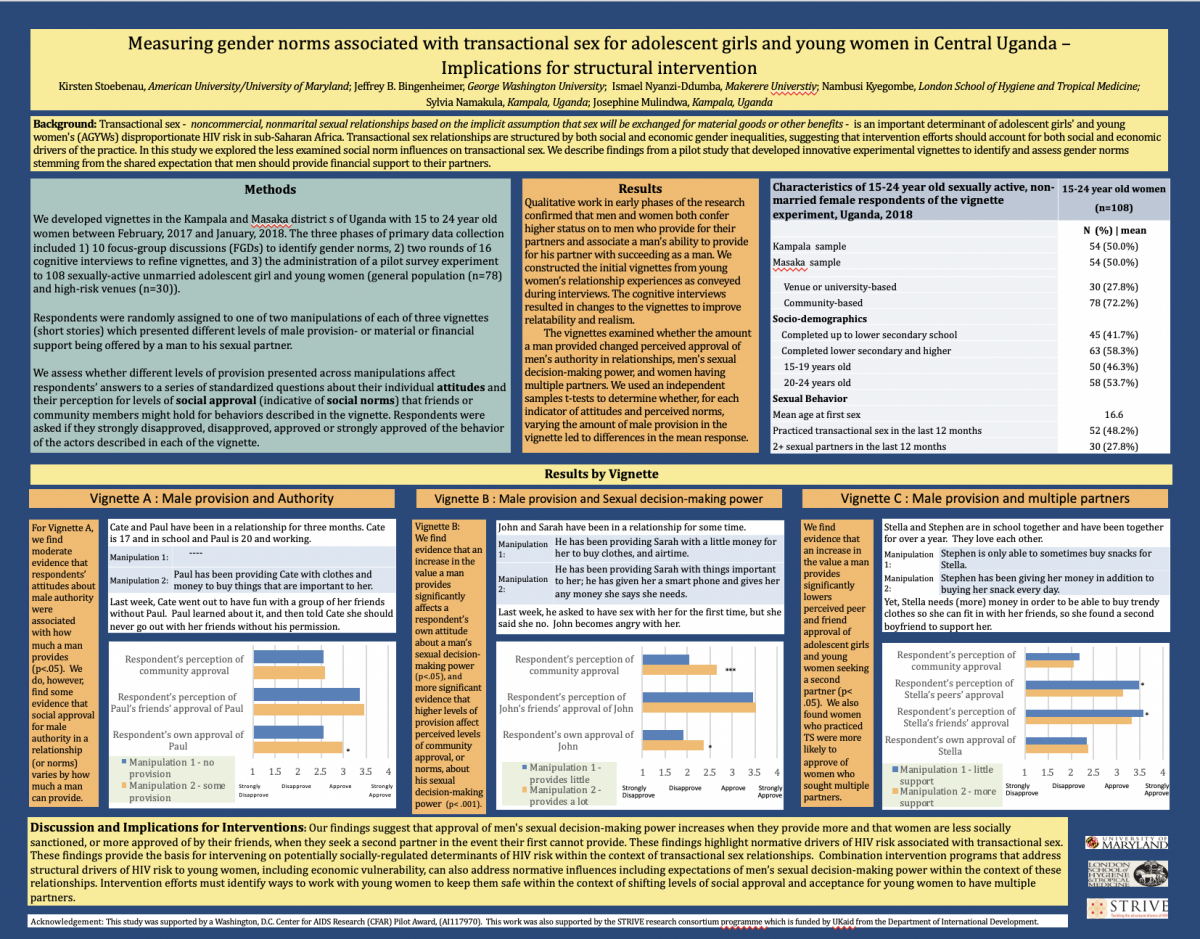This poster was originally presented at the AIDS2018 Conference.

It presents the results of a study in Uganda that explored social norm influences on transactional sex using experimental vignettes to identify and assess gender norms stemming from the shared expectation that men should provide financial support to their partners.
Impact case study: Prioritising combination HIV prevention for adolescent girls and young women in South Africa
Adolescent girls and young women in southern Africa and particularly South Africa currently constitute the population most vulnerable to HIV infection. Many social factors contribute to this risk, among them widespread gender inequalities and the high prevalence of intimate partner and other forms of violence. Oral pre-exposure prophylaxis (PrEP) offers an effective new HIV prevention tool that women could potentially control.
Evidence brief: Samata intervention to increase secondary school completion and reduce child marriage among adolescent girls from marginalised communities
The Samata trial assessed the impact of a multi-level structural and norms-based intervention developed by the Indian not-for-profit organisation, Karnataka Health Promotion Trust (KHPT). The trial was designed to reduce secondary school dropout and child marriage among marginalised scheduled caste/scheduled tribe (SC/ST) adolescent girls living in rural settings in South India.
A number of structural and norms-based factors function as drivers of under-age marriage, early sexual debut and school dropout.
Technical brief: Social Norms
A number of structural inequalities and harmful practices are associated with increased HIV vulnerability. The concept of social norms provides a way to understand what sustains these practices and structures. By addressing problematic norms, it is possible to challenge these structures and thus reduce HIV risk.
Increasing mobility and visibility of adolescent girls and young women through a sports based gender intervention among low income communities in Mumbai
This chapter explores adolescent girls’ and young women’s marginalised status in sports and public spaces in Mumbai’s low-income communities. The study uses qualitative and quantitative data from a cohort of female participants aged 12–16 and 20–25 years and their parents from low-income communities.
How does partner violence affect HIV treatment during pregnancy? - Abigail Hatcher
While intimate partner violence has long been understood as a factor driving HIV risk, only recently has research and policy begun to recognise its influence in the lives of women already living with HIV. Partner violence may be particularly challenging during pregnancy, and skipping HIV medicine at this time can be especially risky for the health of the woman and her infant. This Learning Lab highlights recent work in measuring and addressing partner violence within the cascade of prevention of mother-to-child HIV transmission (PMTCT).
‘It’s because I like things… it’s a status and he buys me airtime’: exploring the role of transactional sex in young women’s consumption patterns in rural South Africa (secondary findings from HPTN 068)
‘Transactional sex’, defined as a non-marital, non-commercial sexual relationship in which money or material goods are exchanged for sex, is associated with young women’s increased vulnerability to HIV infection. Existing research illustrates that the motivations for transactional sex are complex. The fulfilment of psycho-social needs such as the need to belong to a peer group are important factors underlying young women’s desires to obtain certain consumption items and thus engage in transactional sex.
Key findings
Intervening in masculinity: work, relationships and violence among the intimate partners of female sex workers in South India
Although health researchers have begun to examine the forms of violence and power dynamics that play out in the intimate relationships of female sex workers (FSWs) in India, this knowledge has tended to focus on the perspectives of women, leaving men’s motivations and attitudes relatively unexamined.
Results from the Samata Trial: An intervention to reduce child marriage and increase secondary school completion among adolescent girls in south India - Ravi Prakash and Tara Beattie
This Learning Lab presents findings from the Samata cluster randomised-control Trial, in rural south India. The study tested whether the Samata programme – a comprehensive behavioural intervention – could reduce secondary school drop-out and child marriage among marginalised adolescent girls.
Understanding the Relationship Between Female Sex Workers and Their Intimate Partners: Lessons and Initial Findings From Participatory Research in North Karnataka, South India
While traditional HIV prevention programs with female sex workers (FSWs) in Karnataka, India, have focused on reducing HIV transmission between FSWs and clients through increased condom use, these programs have not fully addressed the transmission risk between FSWs and their non-paying intimate partners (IPs). Condom use is infrequent and violence is recurrent in these relationships and there is little evidence on the precise nature of FSW–IP relationships.



